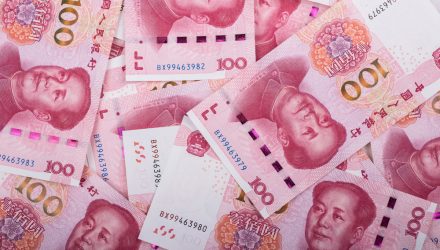China country-related exchange traded funds have taken a turn for the worse as a declining macroeconomic outlook and geopolitical risks weigh on this emerging market.
Year-to-date, the iShares MSCI China ETF (NASDAQ: MCHI) has fallen 24.3%, the Xtrackers CSI 300 China A-Shares ETF (ASHR) has declined 25.4%, and the SPDR S&P China ETF (NYSEArca: GXC) has decreased 23.3%.
Meanwhile, the VanEck Vectors China Bond ETF (CBON) fell 4.9% and the KraneShares Bloomberg China Bond Inclusion Index ETF (KBND) has dropped 4.7% so far this year.
In response to the uncertain macroeconomic and geopolitical outlook, BlackRock has downwardly revised its stance on Chinese stocks and government bonds, Bloomberg reports.
“China’s ties to Russia also have created a new geopolitical concern that requires more compensation for holding Chinese assets, we think,” Jean Boivin, head of the BlackRock Investment Institute, said in a weekly note to clients.
The asset manager also saw “little chance of a perfect economic scenario of low inflation and growth humming along. Last week’s market rout shows investors are adjusting to this reality.”
Dragging on the Chinese economy, the impact of China’s latest COVID-19 outbreak is more than 10 times that of the initial wave in Wuhan in 2020, South China Morning Post reports.
Xu Jianguo, associate professor of economics at the National School of Development in Peking University, calculated that the current coronavirus-driven impediments to economic activity, including lockdowns and transport restrictions, have affected 160 million people so far this year and cost the Chinese economy about 18 trillion yuan, or $2.68 trillion.
In comparison, the initial outbreak in the province of Wuhan two years ago affected 13 million people and contributed to 1.7 trillion yuan worth of economic damage.
International brands are also revealing the fallout from China’s “zero COVID” policy, where strict lockdowns have been implemented and almost every major business has been disrupted.
For instance, Starbucks (SBUX) suspended financial guidance for the next six months, with CEO Howard Schultz calling it “the only responsible course of action.”
“The situation in China is unprecedented,” Schultz told analysts on an earnings call. “Conditions in China are such that we have virtually no ability to predict our performance in China in the back half of the year.”
For more news, information, and strategy, visit ETF Trends.
